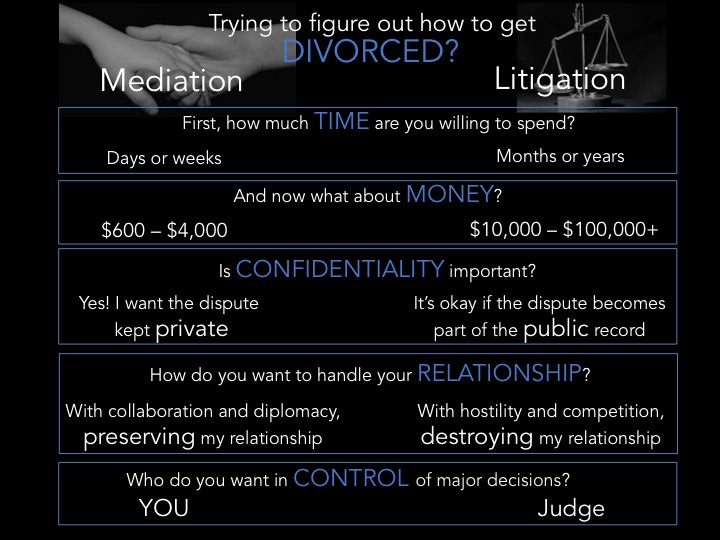Thinking About Getting a Divorce? Why You Should Consider Mediation Rather Than Litigation...7/5/2016  The process of going through a divorce can seem daunting, stressful, and overwhelmingly difficult. For most people, a divorce settlement is the biggest negotiation they will ever pursue, and the stakes seem unbelievably high. Divorcing can create a certain sense of animosity, or tension, which can set the stage for a long and ugly litigation battle. Mediation, however, provides an alternative route. It is a voluntary, confidential, and collaborative process in which the parties are empowered to work with a neutral third-person mediator and resolve their dispute by negotiation and mutual consent. In terms of personal resources, mediation takes much less time and money than litigation, thereby eliminating important sources of stress from what is already a stressful and difficult situation. On average, litigation can cost anywhere between about $10,000 to upwards of $100,000, while mediation is significantly less expensive, ranging from less than $600 to $4,000 or so. Mediation can also resolve a dispute in a few days or weeks, while litigation may take months or even years before you see any type of measurable outcome. Another critical aspect of mediation is that it is entirely confidential. The details of your dispute remain between you and the other party involved. In litigation, those details may be entered into a public court record and so your sensitive information may no longer stay private. Mediation is an important consideration for preserving the family unit and its dignity, especially when there are children involved. For many people, divorce may seem to be synonymous with anger, hatred, or competition. Litigation often seems adversarial, involving a court “battle” where one party emerges as the “winner.” Litigation can often be about punishment, or retribution for the past. Mediation, on the other hand, helps a couple work together cooperatively and diplomatically, preserving the relationship between the two parties. Mediation allows both parties to be heard and ultimately results in a decision where the feelings and needs of both parties are considered. Finally, it is important to note that in litigation the ultimate decision is out of your control. A judge has the final say, and so the outcome is unpredictable and may be unexpected. Mediation, however, removes that unpredictability. Because the involved parties are in control of the decision, compliance with the ultimate agreement is typically high, and the stage is set post divorce for future conversations and agreements. Just remember, decision making, even in the case of a contentious divorce, is cooperative if you work together rather than against each other. Mediation works to resolve disputes! Blog and infographic by Little Falls Mediation's Kate Bauman.
1 Comment
2/8/2021 04:01:09 pm
I had no idea that divorce mediation works as a way to preserve your connection with your loved one and have a peaceful separation. After years of marriage, my friend told me that he doesn't feel anything for his spouse anymore. I think it's a good idea that he reaches out to a mediator for help.
Reply
Leave a Reply. |
AuthorEllice Halpern, J.D., is a Virginia Supreme Court certified general and family mediator. Archives
June 2024
Categories |
Copyright © 2015 www.littlefallsmediation.com

 RSS Feed
RSS Feed